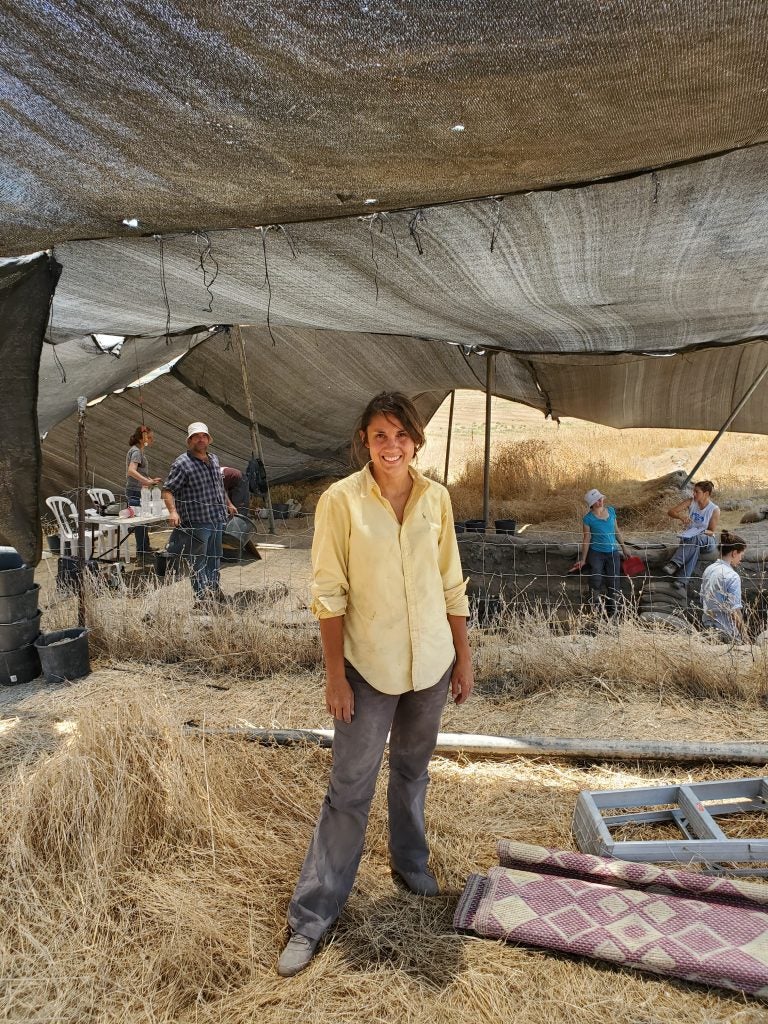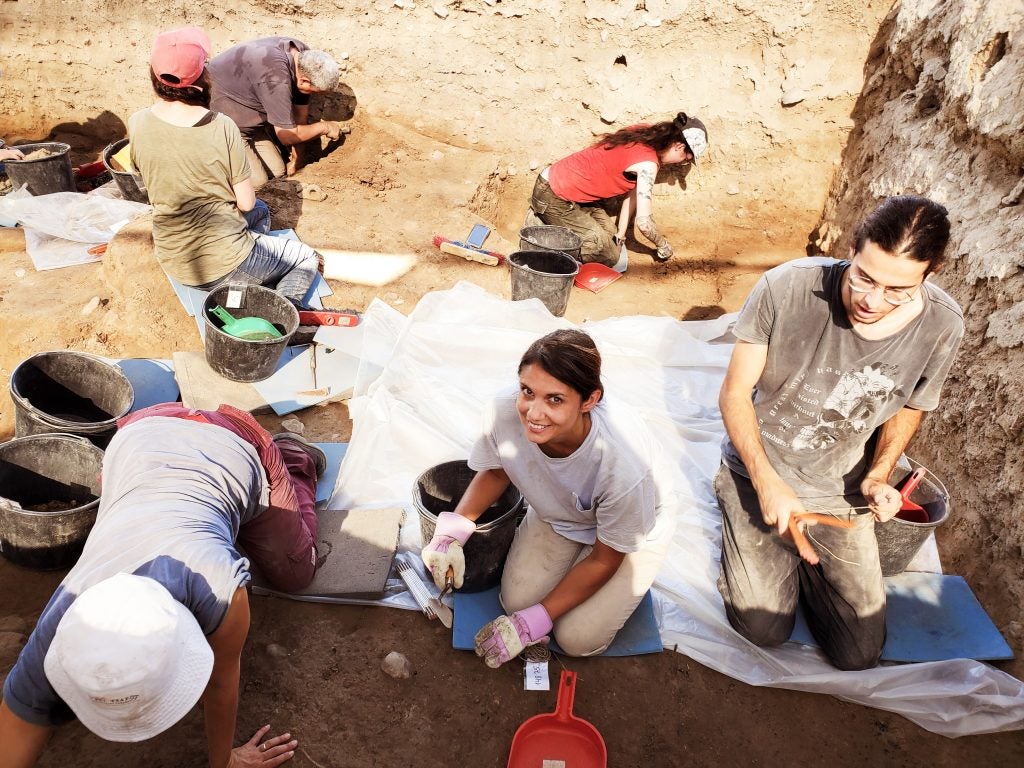
Story by JOYANNA LOVE
Photos Contributed
It was a hot, July day in Israel when Celeste Onchuck had her first glimpse of the archeological site that she would work in for the next 18 days.
Onchuck’s interest in archeology started at a young age.
“I was probably 4 or 5 years old when I got an interest in it … I loved the show ‘Reading Rainbow,’ and the host went inside of a pyramid one day, and that was it, I was so fascinated with everything old and ancient,” Onchuck said.
Her love of history in general and ancient times specifically grew throughout her life.
Onchuck completed her bachelor’s degree at the University of Montevallo in social sciences with a history concentration. She completed her master’s degree in history education at Alabama State University. Today, Onchuck uses her passion for history to make the subject interesting to her Ancient World History students at Jemison Middle School.
She began to pursue an opportunity to work alongside professional archeologists at an ancient site after hearing about a program and scholarships that were available.
“In my spare time, I find myself researching and just looking up things,” Onchuck said.
During one such time of research on the internet, Onchuck saw something about Biblical Archeology Society.
“I thought, ‘Wow, this is what I want to do, and there might be a way to have it funded,’” Onchuck said.
Her initial application was unsuccessful, but after advice from the committee, Onchuck reapplied and was accepted.
“I was so surprised that last year I got a $4,000 scholarship to go to any of the dig sites that they work with,” Onchuck said.
When Onchuck began looking at the sites that were available, she decided to delay her trip because it would mean being away from her young children for a while. Instead, she took them on a trip to Israel with her mom and sister. Seeing all of the archeological sites during her visit further convinced Onchuck that she wanted to participate in a dig.
Onckuck wanted to go to a site that was connected to one of the accounts in the Bible, but she also needed something that was in the summer when school was not in session. In the end, she chose a site that was unearthing artifacts from around 6,000 to 7,000 years ago. Onchuck said this was even before Abraham came to live in the area.
The site, Tel Tsaf, is located in the Jordan Valley and has been excavated since 2013.
Teams have worked at the site for a month each summer.
“The excavation is being carried out by the Zinman Institute of Archaeology at the University of Haifa in Israel,” Onchuck said.
Onchuck started her work alongside professional archeologists and students of archeology washing pieces of pottery that had been unearthed.
“Just diving in head first into something I had never done hands-on before,” Onchuck said.
Each day started early, Onchuck said she was at the dig site by 5 a.m. in order to be able to work before it got too hot.
“It’s one of the hottest places in Israel,” Onchuck said.
The team worked for seven hours at a time.
“I loved every minute of it, and I wouldn’t trade any of it because I learned so much,” Onchuck said. “… It was so neat that it didn’t matter that I was just a volunteer looking to start my Ph.D. soon, and I had not ever done it before they put me in an excavation pit right next to people who have been in archeology programs digging or researching for years and years and years, shoulder to shoulder doing the same thing as everybody else. When you are learning in that kind of situation you learn real quick.”
The team sifted through 5 centimeters of dirt at a time. When an item was found, it was labeled and set aside.

Pottery and animal bones, including those from pigs, sheep and goats, were the most prevalent things found. Onchuck said Tel Tsaf was known for a distinct type of pottery.
“I found a piece of obsidian, which the archeologist was excited about because he could tell that it had come from somewhere else, so the people were involved in trade,” Onchuck said.
Other items found included beads, flint tools and a pit where meat would have been roasted.
“The purpose … of why they are digging there is it is one of the first places that they have evidence of grain storage, silos,” Onchuck said. “So, what this tells us about history is that it is one of the earliest settlements after people went from being hunter gatherers to a settled way of life.”
Workers at the site were from a variety of countries, including Israel, the United States, Germany, Poland, Finland and the United Kingdom.
Onchuck said the experience has given her stories to tell her students related to what they are studying.
“Storytelling is a very effective way to teach,” Onchuck said.
She said teaching history as a story keeps her students interested in the subject.
“Knowing how archeologists work has helped me a lot,” Onchuck said.
Since the trip, Onchuck has been accepted to the
University of Haifa to complete her doctorate degree.
“My advisor and the head of the excavations is Dr. Danny Rosenberg,” Onchuck said.
She said “it all fell into place” for her to pursue this degree.
The program consists of writing her dissertation, so she will be able to continue teaching. She is in regular communication with Rosenberg and plans to return to Israel for the next few summers. She said being at archeological sites will help her better understand the process.
Onchuck expects the project to take her five years to complete. In her paper, she will focus on studying agricultural-themed statues from different cultures.
Onchuck said statues of women grinding grain have been found at archeological sites in several different countries, including Israel, Egypt, Greece, Cyprus and United States of America (from Native American tribes).
“I’m basically cataloguing them and putting them in context, where were they found, what was the significance,” Onchuck said.
She said the project is a good way to “get my foot in the door in archeology and in that area where I am interested.”
Onchuck said her husband Andy “is intrigued by all this stuff ” and is interested in talking about what she is learning, even though he is not interested in traveling.
The couple has two children.
She said the format in which she is doing her doctorate will allow her to complete the work without taking time away from her family. Onchuck hopes to be able to visit archeology sites
connected to the Bible in the future.
Onchuck is in her fourth year of teaching at JMS, and she has 15 years of experience in the field.
